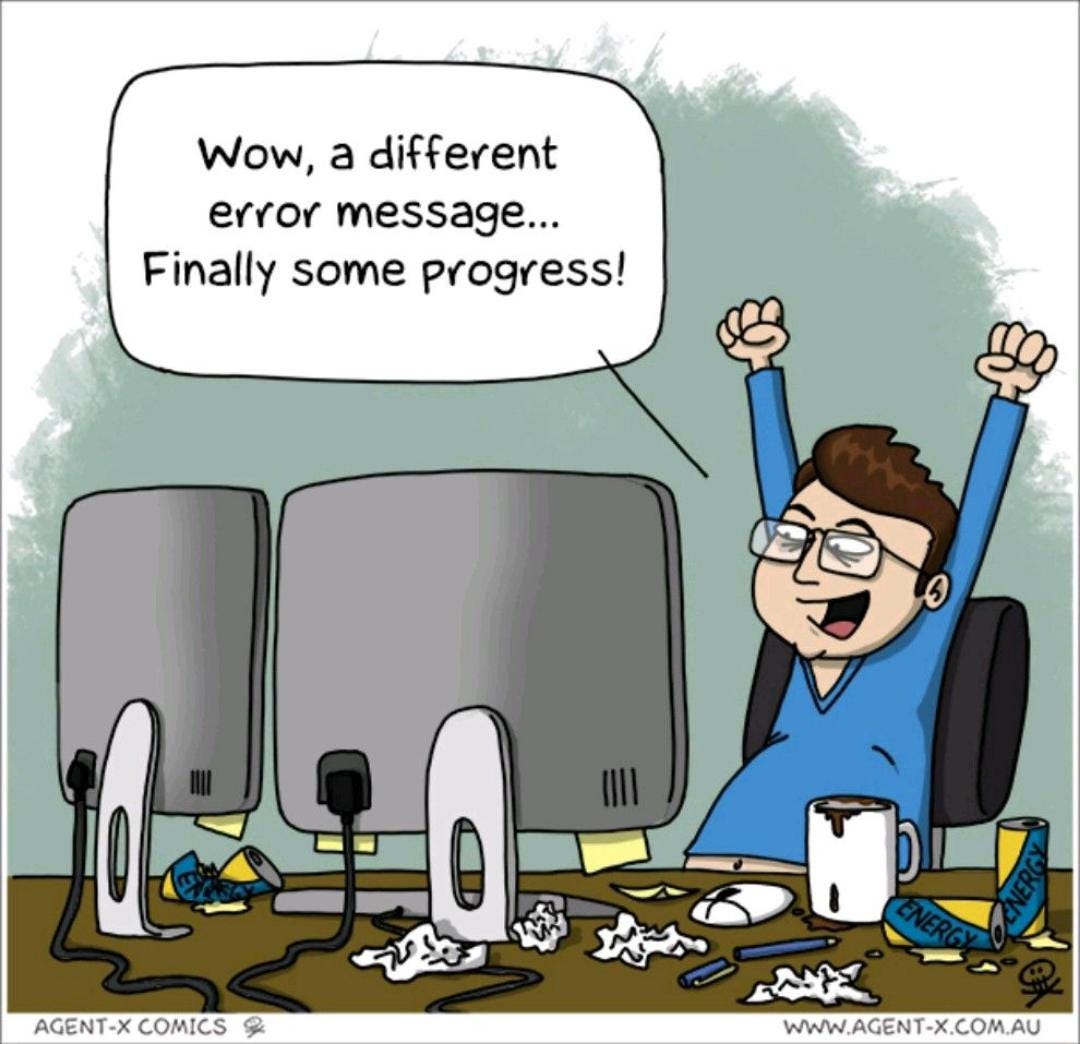When I was starting out on my journey as a developer, I used to get stuck for painfully long stretches of time. I didn’t know how to read C++ error messages effectively—those cryptic, intimidating messages that even today can be hard to decipher, let alone more than a decade ago.
So what does it mean to be blocked for a long time?
It means spending several hours—or even days—spinning your wheels on a single issue. I remember a time early in my career when, due to some pending office reorganization, I wasn't even sitting with my immediate team. That made it harder to reach out for help. Ironically, that feels a bit funny now after working remotely for several years—but back then, it really added to the isolation.
And when I finally reached the point of desperation and asked for help? The problem was usually resolved in minutes.
The Stigma Around Asking for Help
Back then, I saw asking for help as a sign of weakness. That probably stems from my upbringing—perhaps a mindset passed down through generations. But I know I’m not the only one who’s felt that way.
Over time, I’ve come to understand something important: asking for help is not a weakness. On the contrary, it’s a sign of strength and self-assurance.
When you know your worth, you're not afraid to admit when you're stuck. You know you’re capable, you know you solve plenty of problems on your own—but not every problem. That’s normal.
You also recognize that software development is a team sport. You rely on others, and they rely on you. Sometimes you're the one lending a hand; other times, you're the one in need. That's how collaboration works.
If your goal is to move fast and help your team succeed, it’s in everyone’s interest to get yourself unblocked rather than wasting hours or days in frustration with no visible progress.
Should You Ask for Help Every Time You're Blocked?
Let’s pause here for a second.
Does this mean you should immediately ask for help every time you hit a wall?
Not exactly.
If you run to someone the moment you hit an obstacle, you’re not giving yourself the chance to grow. You won't learn as deeply, and your colleagues might become a bit weary of constantly being interrupted.
There’s a fine line between being stuck for too long and asking for help too quickly.
If you have some ideas, pursue them. Try to understand the issue. Attempt a few fixes. You might not solve it fully, but you’ll likely make progress—or at least uncover new information that makes your eventual question clearer and more focused.
Use Your Tools: Start with an LLM
Before reaching out to a teammate, talk to an LLM (large language model). Yes, literally.
There’s a good chance that your colleague would do the same anyway. Modern LLMs are surprisingly good at deciphering error messages and debugging tricky issues—especially in well-known tech stacks. They can help you interpret error logs, suggest next steps, or even guide you to relevant documentation.
Use that resource. It’s like having a 24/7 junior mentor that never gets tired or annoyed.
The Rubber Duck Technique
Still stuck? Try the classic rubber duck debugging technique.
Here’s how it works: explain the problem out loud, as if you’re talking to someone else—ideally to a literal rubber duck on your desk, but a chair, a pet, or even the air will do. The act of articulating the problem often leads to new insights. It forces you to slow down and think clearly, step by step.
Better yet, imagine you're explaining the issue to a specific colleague. What questions would they ask you? “Did you try X?”, “Have you checked Y?”, “What happens if you change Z?” You’d be surprised how often this mental exercise leads to an “Aha!” moment.
Personally, I’ve resolved countless bugs by doing this—without bothering anyone at all.
And If You’re Still Blocked…
Then ask for help. Don’t sit on a problem endlessly. Don’t let pride or fear hold you back.
Asking for help is not giving up. It’s not surrender. It’s a strategic move to keep the momentum going—for yourself and for your team.
If anything, it shows that you care. You’re investing in progress rather than letting time slip away.
So remember this: asking for help is a sign of confidence, not weakness. Use your tools, trust your team, and never stay blocked for too long.




